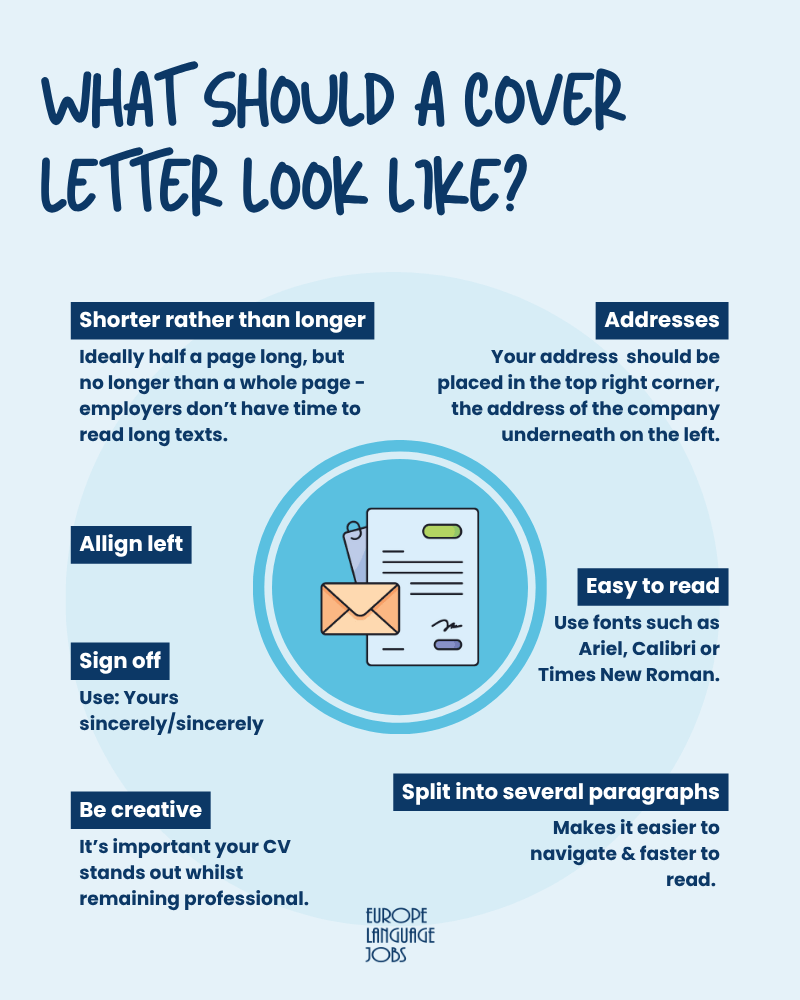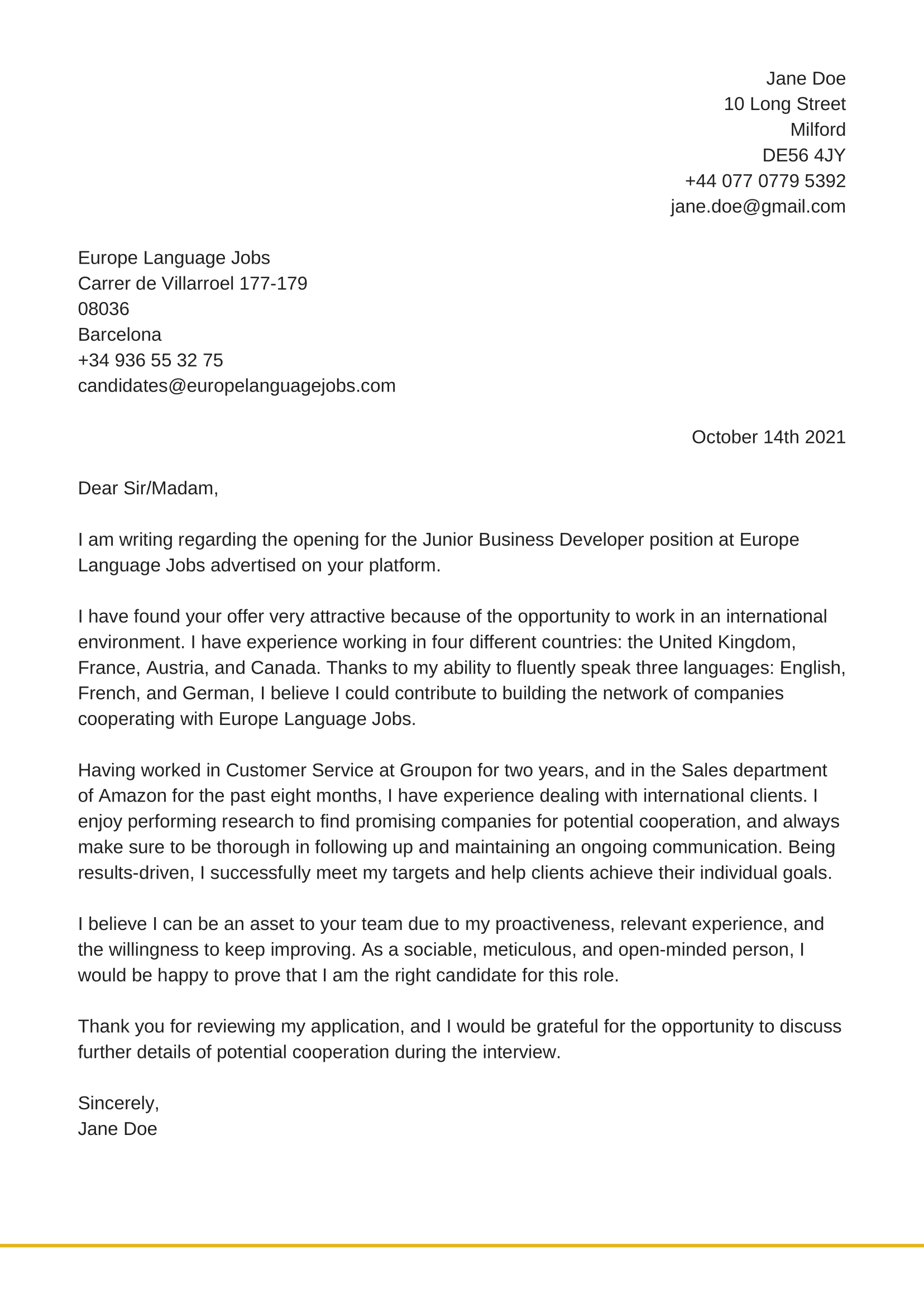Updated: October 2025
A cover letter is your opportunity to express your personality a little. In a CV, there is no space to introduce yourself on a personal and detailed level.
This is the function of the cover letter. In many ways, it is an outdated and obsolete entity. Nonetheless, more often than not, it is necessary for a job application. The original function of a cover letter dates back to when we used to send CVs in the post. Back then, looking for a job wasn’t as easy as pinging across an email with an attached CV.
The role of the cover letter (so named because of its original role as the cover page of a posted CV) was to explain exactly why you were sending a CV. It also specified which position you were interested in, as a big company would likely have several available vacancies at one time.
- Why should I write a cover letter?
- What should a professional cover letter look like?
- How long should cover letters be?
- What should a good cover letter include?
- Should I use cover letter templates?
Why should I write a cover letter if I've already got my CV?
Whether you think it necessary or not, the recruitment world is one where everyone is on their best behaviour, and formalities, obsolete as you may think, are often the difference between two strong candidates.
If the competition is playing by the rules, you’d be very brave to go against the grain. This first step is to make sure your CV is looking on point, and then get started on that cover letter!
Your cover letter is your opportunity to make your application look more distinctive to the company. In short, it provides some context to your CV and explains why you are applying. It should not - I repeat, not - be a copy of your CV.
Your cover letter should only enhance your application, not summarise what you've already provided in the application. By the time recruiters get around to reading your cover letter, they will likely have already read through your CV.
They want to find out more about you and hear your voice through the cover letter. This is the first real impression of who you are that you will be giving them.
What should a professional cover letter look like?
We have created an infographic of some basic cover letter tips to help you visualise them better.
It is important to note that sending a generic, impersonal cover letter is counterproductive. The whole point of the cover letter is to explain what you can bring to the company in the specific role you are applying for.

How long should cover letters be?
So, we’ve already established that a cover letter is a good idea. But the question that so many candidates struggle with is: How long should my cover letter be?
The common worry is making it too short and thus making your cover letter look like not enough effort has been put into writing it.
Our biggest piece of advice? Avoid lengthy, boring text at all costs. Stats show that recruiters prefer a half-page cover letter to a full one. There’s nothing like a big chunk of unbroken text to put off potential employers.
You may put them off even reading it altogether if it looks like too much time and effort to read. Cover letters should be easy to read and to the point - it’s all about getting the balance right.
What should a good cover letter include?
Remember that your cover letter is not your CV. This is your chance to introduce yourself as a person, convey why you want to work in this position, and precisely why you are the perfect candidate.
-
Tell them why you like the company
Too many candidates feel that the cover letter is simply a further opportunity to big themselves up. Tell the company what appeals to you about them and the position.
Also, providing some specific details about the company will prove that you are aware of who you are dealing with and what you are applying for.
This will make your cover letter more specific to the position. No one wants to feel like they are reading a generic letter that has likely been sent to plenty of other companies to apply for completely different jobs.
-
THEN tell them what you offer
Simply telling them what your skills are isn’t enough. You need to apply your skills to the company. In other words, tell them why you will be an asset to their company, and what you would do to help the business grow if you got the position. What do you bring to the table?
Using measurable skillsand stats is a great idea to give the recruiter a concrete example of just how valuable you would be to the company.
It's highly unlikely that when you tell the employer that: "I was the best employee in my former company", they'll take your word for it. You need some solid facts to back it up.
You also need to be as specific as possible. How were you the best employee? Did you make the most sales? Generate the most leads? Manage the most clients?
Using website traffic, sales or conversions would be the perfect way to show off what you've achieved in previous positions.
-
Express how much you want the position
Getting the balance between seeming desperate and seeming too carefree is tough. Use phrases like, "The prospect of performing in this role genuinely excites me".
Highlight how this role would help you grow professionally and develop in an area you're truly passionate about.
-
Show warmth
People want to work with nice people. Therefore, you should maintain a professional but kind tone throughout the cover letter. Your cover letter should show your voice, and give an idea of who you are as a person - something your CV can't do.
Whilst remaining formal, try and find a way to show your personality in it.
Make sure that...
It's easy to read
Make your cover letter look appealing by writing short, concise paragraphs and using a font that's friendly to the eye. Ensure that your sentences aren't too long or convoluted - your application is likely to be one of many, and recruiters don't want to spend half an hour reading it.
Running your final cover letter draft through a summary generator can be helpful in improving conciseness and clarity. It will remove any unnecessary info or wording in no time.
You check it through!!
Something as simple as a silly misspelling could cost you an interview. Taking a couple of minutes to double-check will always be worth your while. Having lots of little mistakes in your cover letter will show carelessness, and employers won't believe you are very serious about your application.
Any gaps in your CV are explained
Taking time out to travel, get back into education, or look after kids are all very normal reasons for gaps in your CV. However, not explaining lengthy gaps in your career can be concerning to employers if they're not explained!
CVs aren't really the place to explain these gaps. Instead, put them in your cover letter where you can explain what you've learnt from these experiences and why they'll add to your strengths as a candidate.
It's personalised
Yes, we've already said this a million times, but it can't be stressed enough - cover letters are meant to explain why you would benefit the specific company you are applying to. If you send a generic cover letter, it will be blindingly obvious to the employer. Make sure you show you care about this application and that you want this job.
Should I use cover letter templates?
We advise against using a cover letter template. You will probably find many of those online, where all you need to do is change a couple of details to personalise it a little. In our experience, recruiters can smell a default cover letter from a mile away - they probably know the most popular templates by heart.
Think about it: a cover letter is your only opportunity to express yourself and let the recruiter get to know you better before the interview. It's only natural it will work to your benefit if you write it yourself - using your own words and style, and letting your personality seep through.
The same applies to using cover letter writing services. They are really helpful when it comes to providing advice for a cover letter you have already written, but avoid hiring them to write it for you. Nobody - even professional writers - know you as well as you do, so the only person who knows what your cover letter should include is you!
A cover letter example

Now that you have read these essential tips, you surely know what a professional cover letter should look like, so go ahead and start working on your first draft. Come back to these tips once you are done writing your perfect cover letter and look over the content to ensure all key elements are present.
Feeling inspired? Visit our blog for more career advice! How can you be sure the information we provide is top-notch? We are a group of professionals working with recruiters, career coaches, and HR specialists from all over the world!
Trust our experience and let us help you find a new job in Europe!










































Richard Koim1mo ago
That is helpful, thank you.
That is helpful, thank you.